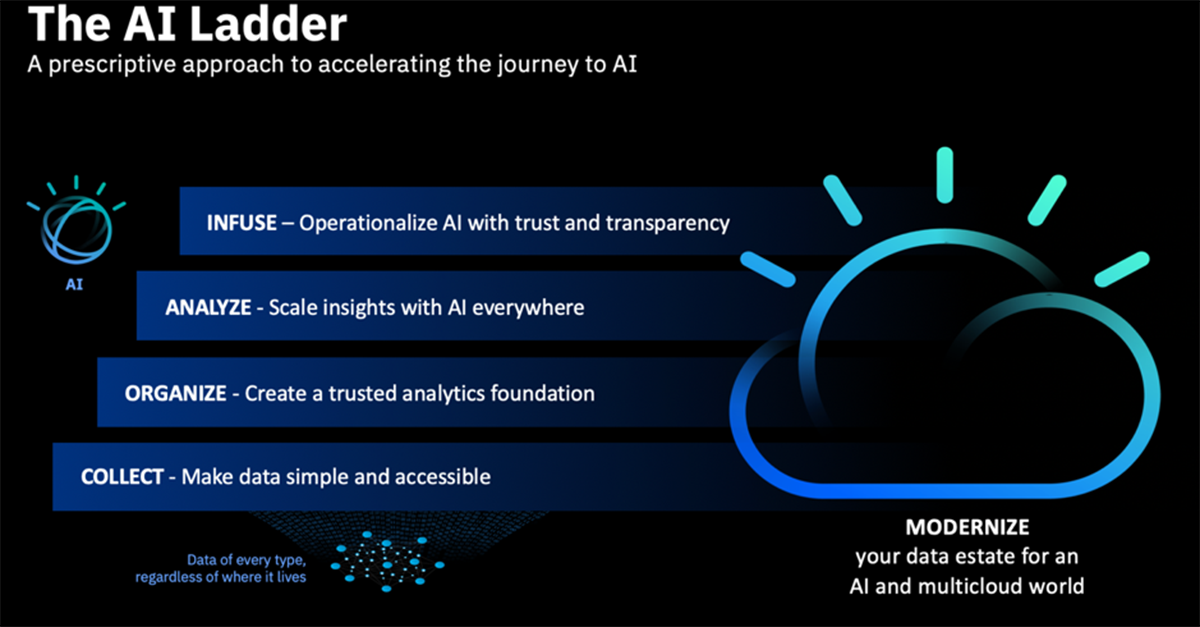Cloud
Artificial Intelligence – a team sport
3 May, 2019 | Written by: Chris Williams
Categorized: Artificial Intelligence | Cloud | IBM Events UK - Blog | Perspectives
Share this post:
What does it mean to deploy artificial intelligence into your business and what makes an AI project successful?
These are some of the many questions we will be tackling in depth at our upcoming event on the 21st May at The Groucho Club, but until then, here are some topics you might wish to consider.
Over the past five years of working in AI with IBM Watson, I have been asked many times what does it mean to get started with AI? What can I do with AI in my business? I like to turn the question around and ask “what aspects of your business do you want to improve?” or “what are you trying to achieve”. The answers I get are many and varied but broadly can be put in these categories:
- I want to allow my customers or employees or other stakeholders to answer their own questions.
- I want to make my employees more productive and make their jobs more interesting.
- I want to automate parts of processes that currently require laborious human intervention.
- I want to better understand what is going on in my business.
Often there is an implicit or explicit desire to reduce costs. The good news is that a well implemented AI solution will usually help with that goal as well as delivering many other benefits such as improved customer and employee satisfaction and increased revenues.
How is the AI going to enhance the experience of my customers and/or employees
I cannot over emphasise the importance of great design to the success of AI projects. Even the process automation implementations need to integrate seamlessly with the rest of the process and handle exceptions gracefully.
In the case of AI systems with user interfaces the expectation of users is extremely high. The proliferation of mobile applications and personal assistants has raised the bar. Users will expect to be able to ask questions (e.g. of a chatbot) in a very natural way and to be understood. They will expect to be offered choices and suggestions that meet their needs and be presented with information in formats and styles that are engaging, appropriate, great to look at and easy to interact with.
Integration with other systems
If somebody wants to know their account balance you need to connect to the appropriate system(s), gather the data and display it to the user. Integrating with existing systems is often one of the more challenging parts of the implementation but can really make the difference in terms of the capabilities of the system.
The fuel for AI is data
AI projects will only succeed when underpinned by a solid foundation of trusted, reliable information. This applies to both the data used to train the AI and to the data used as input on a day to day basis. The AI Ladder is a good model that explains the relationship between AI and its underlying data platform.

Another thing to consider is where will you build, train and run your AI. AI workloads often lend themselves to running in the public cloud but you may have good reasons (security for example) to run them in a private cloud or on premise. It is highly likely that your data will be in multiple locations and on multiple clouds. You need to have a clear strategy on how you will manage this complexity and optimise your implementation.
The AI itself needs to be accurate, trusted, reliable, transparent and unbiased.
You need to be able to explain what it is doing and why to a customer or even a regulator when asked. You need to train the AI using representative data and you need to get the people who really understand your business and your data involved in the training. AI is a team sport. You need data scientists, developers, business experts and operational teams to all work together.
The IBM Watson Platform, alongside other IBM capabilities, has very strong support for all the concepts mentioned and IBM has vast experience of real world AI Implementations.
Join me on 21st May, at our #WatsonAI breakfast briefing to learn more.

Data Science & AI Architect
Frontier Fusion: Accelerating the Path to Net Zero with Next Generation Innovation
Delivering the world’s first fusion powerplants has long been referred to as a grand challenge – requiring international collaboration across a broad range of technical disciplines at the forefront of science and engineering. To recreate a star here on Earth requires a complex piece of engineering called a “tokamak” essentially, a “magnetic bottle”. Our […]
Unlocking the Future of Financial Services with IBM Consulting at Think London 2024
In a world where financial services are evolving at an unprecedented pace, staying ahead of the curve is crucial. The recent IBM Think London event, IBM’s flagship UK event, brought together industry leaders, partners, and clients to explore how cutting-edge technologies like generative AI and hybrid cloud infrastructure are transforming the sector. For IBM […]
Converting website traffic into happy customers with a smart virtual assistant
With a long track record of guiding companies across various sectors through digital transformation, IBM Business Partner WM Promus is now focusing AI innovation. Eileen O’Mahony, General Manager at WM Promus, explains how her company helped a UK-based commercial finance brokerage enhance customer experience, and develop new sales leads using IBM watsonx and IBM […]





























